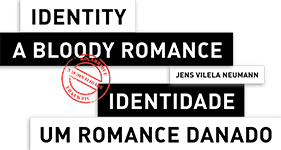„Identity entered modern mind and practice dressed from the start as an individual task. It was up to the individual to find escape from uncertainty. Not for the first and not for the last time, socially created problems were to be resolved by individual efforts, and collective maladies healed by private medicine.“
by Zygmunt Bauman „From Pilgrim to Tourist – or a Short History of Identity“
PREFACE
“Willkommen, Welcome, Boa Noite! Meine Damen und Herren, Senhores e Senhoras, Ladies and Gentlemen,
this performance is a celebration, a family celebration of a special kind, for us to talk about our past and our future, how we have influenced each other and which marks we have left on each other. We have known each other for over two hundred years, the Mozambicans and the Germans have lived together, loved, argued, accomplished great and small together! The story of this theatrical evening consists of many stories, but there is one force which keeps these many stories together. This evening is dedicated to this force. This force, which is always present in history and yet never appears in any history book, is love. We dedicate today’s family celebration to LOVE.”
I find this quotation from the opening of the play “Identity – a Bloody Romance” appropriate also as an introduction to the exhibition of the same name. The artistic engagement with this topic has a very personal background and begins with my Mozambican wife Inhalambi and our children. Whilst in my family the big issues of identity and migration were negotiated on an almost daily basis between kitchen and living room, my engagement with these issues expanded to extensive research in libraries and film archives, followed by numerous interviews with contemporary witnesses of Mozambican-German relations as well as journeys through Mozambique and Germany, where the pictures were taken and the short films were made.
When I subsequently started writing the play “Identity – a Bloody Romance”, the infinite information, thoughts, impressions and statements fell into place like a puzzle, and with the production of the play and its performance in Maputo I had come back to where I feel at home – in the theatre. And yet at the beginning I was in the same position as most Germans: When I met Inhalambi, I didn’t know where Mozambique was, I had never met a Mozambican before and didn’t even know which language is spoken there. Ten years ago my wife and I travelled to Mozambique together for the (very) first time. On the day of our arrival in Maputo we met hundreds of German-speaking Mozambicans with Saxony accents, who were demonstrating and waving the flag of the GDR. I myself was born and raised in Saxony and never met a person from Africa during GDR times. This made me all the more curious about the demonstrators and I became passionately entangled in German-Mozambican relations.
When our children were born with this mixed identity, I started to wonder how it will be for them to grow up in Germany and being asked by their friends if they are African. What will they know about their mother’s home country, about Mozambique, what will they have gotten from her half of their genetic make-up and how will they see themselves – as Germans? As Mozambicans?
Almost everyone has a “romantic” relation to their own identity. Those involved in this project talked with pride about their experiences and what they have learned, whereby it became apparent that the most comprehensive gain for their personality came especially from the “bloody”, that is their painful experiences, and that an imaginative approach to one’s own history can create a stable identity.
Just as the different aspects of an identity shaped by migration, such as language, sense of belonging, profession, sexuality, economic interests and dependencies, concern me and my family in our everyday life, I wanted – this was my artistic point of departure for this project – to tell the connections between both countries through personal stories. These stories reflect directly the great themes of the North/South discourse and the historical African-Western controversy, but at the same time reveal emotionality and interpersonal aspects, such as that of “Love”.
Jens Vilela Neumann, January 2014, Berlin

